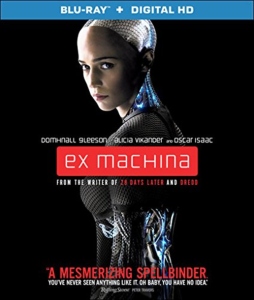“Ex Machina” could be a stage play, as it features four actors in various austere rooms of an isolated scientific compound. Writer Alex Garland, who also penned the excellent zombie film “28 Days Later” (2002) and the love-it-or-hate-it sci-fi think piece “Sunshine” (2007), contrasts those films by keeping “Ex Machina” minimalist in his directorial debut.
Nonetheless, I was hooked. Brilliant scientist Nathan (Oscar Isaac), who built up his fortune by inventing Blue Book (imagine if someone invented Facebook and Google simultaneously), has constructed a robot, Ava (Alicia Vikander, combined with stunning CGI effects that show the robot’s innards). He invites a top computer coder from his company, Caleb (Domhnall Gleeson), to determine if Ava passes the Turing Test – can this robot’s behavior be distinguished from that of a human? If not, she is a true artificial intelligence, rather than merely a great computer program. The fourth character is Kyoko (Sonoya Mizuno), Nathan’s servant who stands around looking pretty but probably has a deeper backstory.
“Ex Machina” reminded me of “2001: A Space Odyssey” in its ascetic vibe with emotional undertones. The two men outwardly act like they like each other, but it’s clear that Nathan is a bit of an a–h— and Caleb is never really comfortable staying at the compound, which locks people in during power outages. “Ex Machina” is filmed in the gorgeous Norwegian wilderness – with forests, rivers, mountains and chunks of ice – but it’s clear that Caleb might as well be in outer space, and is at the mercy of Nathan.
Meanwhile, Caleb bonds with Ava, who is the classic childlike robot just learning how to be human. Caleb asks Nathan the specifics of how he created Ava, and Nathan brushes off the question as irrelevant. That’s also Garland’s cue to the viewer: This isn’t a film about science, it’s a film about human interaction. Someday soon, someone will create an AI and humanity will have to react to it; “Ex Machina” is laying out the ideas we’ll soon be confronted with.
The “Terminator” saga has various versions of how Skynet outsmarts humans, and “Ex Machina” offers an intriguing possibility of how we might get outsmarted by AIs. We tend to think an AI could be good (like the T-800 in “T2”) or evil (like the T-800 in the first “Terminator”), but Nathan mentions a third, chilling possibility: Perhaps Ava is pretending to like Caleb so he will help her escape. That might be the truest human trait of all: The desire to do what it takes to obtain the basic elements that make life worth living — in Ava’s case, freedom to move about.
Speaking of films that can also be stage plays, “Ex Machina” is – weirdly enough – kind of like a less cruel version of “Closer” in the way the characters interact with, confide in and manipulate each other. Garland’s film is set in the near future, but it’s really about the age-old mystery of what’s going on in other people’s heads. We can never be confident of the answer to that question, but by the same token, scientists in AI stories generally know how to build robots that humans will be drawn to.

This includes obvious non-humans from the “Lost in Space” robot to R2-D2, but it’s even more striking when the robots look human. Caleb is of course drawn to the attractive, innocent and fragile Ava, just as the father in last summer’s TV series “Extant” was drawn to his robot son, who was human in most of the ways that mattered.
Indeed, it’s clear right away that Ava passes the Turing Test, and we and Caleb pretty much immediately sympathize with Ava and hope she can have full human freedoms rather than being locked in a lab. “Ex Machina” is also a love story between Caleb and Ava. A cleverly sexy moment occurs when Ava puts on clothes and a wig, covering up her robot innards and therefore looking like a real girl for Caleb.
It’s quite possible that even before an indistinguishable-from-a-human AI is created, we’ll get a robot that’s close enough – one that looks and acts just human enough that we fall for it — and leave ourselves to either be befriended or manipulated.
One fault with “Ex Machina” is that it doesn’t venture outside its comfortable shell of old sci-fi ideas — even if it does explore them effectively – just as Ava struggles to venture outside the compound. It doesn’t deliver a deus ex machina, but it also doesn’t elevate this material to the next level with a big new idea. I wasn’t looking for an overreaching finale like those of “2001” or “Sunshine,” but it’s also a bit disappointing that Garland doesn’t have a trick up his sleeve.

